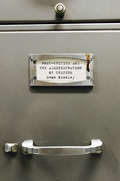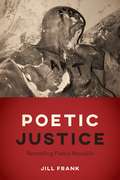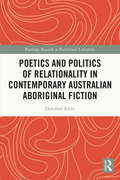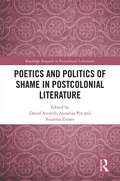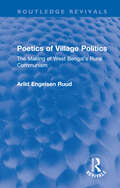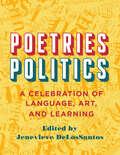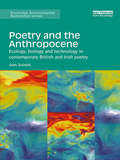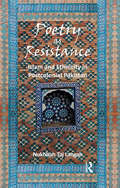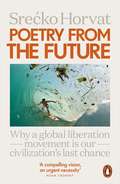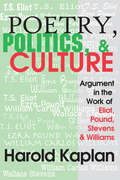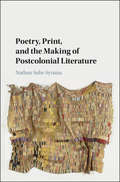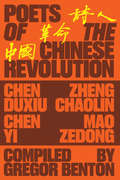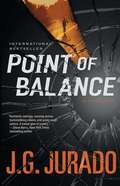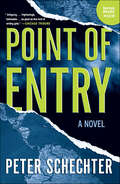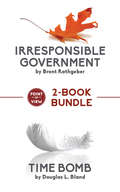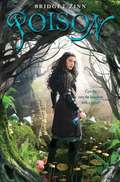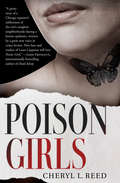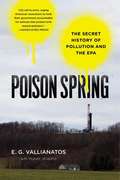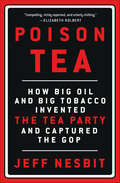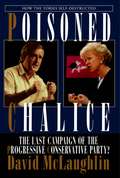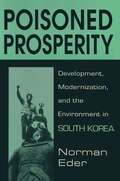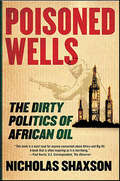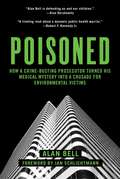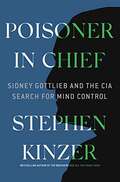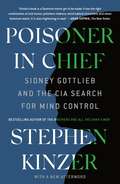- Table View
- List View
Poet-Critics and the Administration of Culture
by Evan KindleyAfter the 1929 crash, Anglo-American poet-critics grappled with the task of legitimizing literature for public funding and consumption. Modernism, Evan Kindley shows, created a new form of labor for writers to perform and gave them unprecedented say over the administration of culture, with consequences for poetry’s role in society still felt today.
Poetic Justice: Rereading Plato's "Republic"
by Jill FrankWhen Plato set his dialogs, written texts were disseminated primarily by performance and recitation. He wrote them, however, when literacy was expanding. Jill Frank argues that there are unique insights to be gained from appreciating Plato’s dialogs as written texts to be read and reread. At the center of these insights are two distinct ways of learning to read in the dialogs. One approach that appears in the Statesman, Sophist, and Protagoras, treats learning to read as a top-down affair, in which authoritative teachers lead students to true beliefs. Another, recommended by Socrates, encourages trial and error and the formation of beliefs based on students’ own fallible experiences. In all of these dialogs, learning to read is likened to coming to know or understand something. Given Plato’s repeated presentation of the analogy between reading and coming to know, what can these two approaches tell us about his dialogs’ representations of philosophy and politics? With Poetic Justice, Jill Frank overturns the conventional view that the Republic endorses a hierarchical ascent to knowledge and the authoritarian politics associated with that philosophy. When learning to read is understood as the passive absorption of a teacher’s beliefs, this reflects the account of Platonic philosophy as authoritative knowledge wielded by philosopher kings who ruled the ideal city. When we learn to read by way of the method Socrates introduces in the Republic, Frank argues, we are offered an education in ethical and political self-governance, one that prompts citizens to challenge all claims to authority, including those of philosophy.
Poetics and Politics of Relationality in Contemporary Australian Aboriginal Fiction (Routledge Research in Postcolonial Literatures)
by Dorothee KleinPoetics and Politics of Relationality in Contemporary Australian Aboriginal Fiction is the first sustained study of the formal particularities of works by Bruce Pascoe, Kim Scott, Tara June Winch, and Alexis Wright. Drawing on a rich theoretical framework that includes approaches to relationality by Aboriginal thinkers, Edouard Glissant, and Jean-Luc Nancy, and recent work in New Formalism and narrative theory, it illustrates how they use a broad range of narrative techniques to mediate, negotiate, and temporarily create networks of relations that interlink all elements of the universe. Through this focus on relationality, Aboriginal writing gains both local and global significance. Locally, these narratives assert Indigenous sovereignty by staging an unbroken interrelatedness of people and their Land. Globally, they intervene into current discourses about humanity’s relationship with the natural environment, urging readers to acknowledge our interrelatedness with and dependence on the land that sustains us.
Poetics and Politics of Shame in Postcolonial Literature (Routledge Research in Postcolonial Literatures)
by David Attwell Annalisa Pes Susanna ZinatoPoetics and Politics of Shame in Postcolonial Literature provides a new and wide-ranging appraisal of shame in colonial and postcolonial literature in English. Bringing together young and established voices in postcolonial studies, these essays tackle shame and racism, shame and agency, shame and ethical recognition, the problem of shamelessness, the shame of willed forgetfulness. Linked by a common thread of reflections on shame and literary writing, the essays consider specifically whether the aesthetic and ethical capacities of literature enable a measure of stability or recuperation in the presence of shame’s destructive potential. The obscenity of the in-human, both in the colonial setting and in aftermaths that show little sign of abating, entails the acute significance of shame as a subject for continuing and urgent critical attention.
Poetics of Village Politics: The Making of West Bengal's Rural Communism (Routledge Revivals)
by Arild Engelsen RuudOriginally published in 2003, this volume studies village politics and the changes brought about in rural society through political developments. It focuses on the social, political and cultural circumstances of communist mobilization in rural West Bengal. It analyses the emergence of rural communism in the local context of changes in the position of women, in caste practices, in economic conditions and in new efforts to create ‘development’. It investigates how this cultural change interacts with the mechanisms and tools of village politics, and using anthropological methods and oral history as tools, allows for a detailed and intimate ethnographic description of village politics and its changes.
Poetries - Politics: A Celebration of Language, Art, and Learning
by Mary Shaw Francois Cornilliat Atif Atkin Ouafaa Deleger Ian Lovoulos Devon Monaghan Jenevieve DeLosSantosPoetries – Politics: A Celebration of Language, Art, and Learning celebrates the best of innovative humanities pedagogy and creative graphic design. Designed and implemented during a time of political divisiveness, the Poetries – Politics project created a space of inviting, multilingual walls on the Rutgers campus, celebrating diversity, community, and cross-cultural exchange. This book, like the original project, provides a platform for the incredible generative power of student-led work. Essays feature the perspectives of three students and professors originally involved in the project, reflecting on their learning and exploring the works they selected for the original exhibition. The essays lead to a beautifully illustrated catalogue of the original student designs. Reproduced in full color and with the accompanying poems in both their original language and a translation, this catalogue commemorates the incredible creative spirit of the project and provides a new way of contemplating these great poetic works.
Poetry and the Anthropocene: Ecology, biology and technology in contemporary British and Irish poetry (Routledge Environmental Humanities)
by Sam SolnickThis book asks what it means to write poetry in and about the Anthropocene, the name given to a geological epoch where humans have a global ecological impact. Combining critical approaches such as ecocriticism and posthumanism with close reading and archival research, it argues that the Anthropocene requires poetry and the humanities to find new ways of thinking about unfamiliar spatial and temporal scales, about how we approach the metaphors and discourses of the sciences, and about the role of those processes and materials that confound humans’ attempts to control or even conceptualise them. Poetry and the Anthropocene draws on the work of a series of poets from across the political and poetic spectrum, analysing how understandings of technology shape literature about place, evolution and the tradition of writing about what still gets called Nature. The book explores how writers’ understanding of sciences such as climatology or biochemistry might shape their poetry’s form, and how literature can respond to environmental crises without descending into agitprop, self-righteousness or apocalyptic cynicism. In the face of the Anthropocene’s radical challenges to ethics, aesthetics and politics, the book shows how poetry offers significant ways of interrogating and rendering the complex relationships between organisms and their environments in a world increasingly marked by technology.
Poetry as Resistance: Islam and Ethnicity in Postcolonial Pakistan
by Nukhbah Taj LangahFocusing on the culturally and historically rich Siraiki-speaking region, often tagged as ‘South Punjab’, this book discusses the ways in which Siraiki creative writers have transformed into political activists, resisting the self-imposed domination of the Punjabi–Mohajir ruling elite. Influenced by Sufi poets, their poetry takes the shape of both protest and dialogue. This book reflects upon the politics of identity and the political complications which are a result of colonisation and later, neo-colonisation of Pakistan. It challenges the philosophy of Pakistan — a state created for Muslims — which is now taking the shape of religious fanaticism, while disregarding ethnic and linguistic issues such as that of Siraiki.
Poetry from the Future: Why a Global Liberation Movement Is Our Civilisation's Last Chance
by Srecko Horvat'A compelling vision, an urgent necessity, and not beyond reach' Noam ChomskyThe past is forgotten, and the future is without hope. Dystopia has become a reality. This is the new normal in our apocalyptic politics - but if we accept it, our helplessness is guaranteed. To bring about real change, argues activist and political philosopher Srecko Horvat, we must first transform our mindset.Ranging through time and space, from the partisan liberation movements of Nazi-occupied Yugoslavia to the contemporary culture, refugee camps and political frontlines of 21st century Europe, Horvat shows that the problems we face today are of an unprecedented nature. To solve them, he argues in this passionate call for a new radical internationalism, we must move beyond existing ways of thinking: beyond borders, national identities and the redundant narratives of the past. Only in this way can we create new models for living and, together, shape a more open and optimistic future.
Poetry, Politics, and Culture: Argument in the Work of Eliot, Pound, Stevens, and Williams
by Harold KaplanA salient feature of modern poetics is its direct connection with cultural history and politics. Among the great American poets of the twentieth century, Wallace Stevens and William Carlos Williams offer a significant contrast with T. S. Eliot and Ezra Pound. Where the latter advocated a theocentric or reactionary response to the cultural crises of modernity, the former affirmed an essentially humanist and democratic social and aesthetic ethos. In Poetry, Politics, and Culture, Harold Kaplan offers a penetrating comparative study of these representative and distinctively influential poets.All four poets wrote in an atmosphere of cultural crisis following World War I, caught as they were between outmoded belief systems and various forms of artistic and political nihilism. While each believed in poetry as a source of cultural values and beliefs, they nevertheless experienced loss of confidence in their own vocation in a world characterized by scientific, rationalist thinking and the mundane struggle for survival. For each, therefore, the poetic imagination was a means of restoring order, or building a new civilization out of chaos. In trying to define a revitalized culture, the four exemplified the perennial quarrel between Europe and America.
Poetry, Print, and the Making of Postcolonial Literature
by Nathan Suhr-SytsmaPoetry, Print, and the Making of Postcolonial Literature reveals an intriguing history of relationships among poets and editors from Ireland and Nigeria, as well as Britain and the Caribbean, during the mid-twentieth-century era of decolonization. The book explores what such leading anglophone poets as Seamus Heaney, Christopher Okigbo, and Derek Walcott had in common: 'peripheral' origins and a desire to address transnational publics without expatriating themselves. The book reconstructs how they gained the imprimatur of both local and London-based cultural institutions. It shows, furthermore, how political crises challenged them to reconsider their poetry's publics. Making substantial use of unpublished archival material, Nathan Suhr-Sytsma examines poems in print, often the pages on which they first appeared, in order to chart the transformation of the anglophone literary world. He argues that these poets' achievements cannot be extricated from the transnational networks through which their poems circulated - and which they in turn remade.
Poets of the Chinese Revolution: Chen Duxiu, Zheng Chaolin, Chen Yi, Mao Zedong
by Mao Tse-Tung Chen Yi Chen DuxiuHow poetry and revolution meshed in Red ChinaThe Chinese Revolution, which fought its way to power seventy years ago, was a complex and protracted event in which groups and individuals with different hopes and expectations for the Revolution competed, although in the end Mao came to rule over the others. Its veterans included many poets, four of whom feature in this anthology. All wrote in the classical style, but their poetry was no less diverse than their politics. Chen Duxiu, led China’s early cultural awakening before founding the Communist Party in 1921. Mao led the Party to power in 1949. Zheng Chaolin, Chen Duxiu’s disciple and, like him, a convert to Trotskyism, spent thirty-four years in jail, first under the Nationalists and then under their Maoist nemeses. The guerrilla leader Chen Yi wrote flamboyant and descriptive poems in mountain bivouacs or the heat of battle.Poetry has played a different role in China, and in Chinese Revolution, from in the West—it is collective and collaborative. But in life, the four poets in this collection were entangled in opposition and even bitter hostility towards one another. Together, the four poets illustrate the complicated relationship between Communist revolution and Chinese cultural tradition.
Point of Balance: A Thriller (Atria Espanol Ser.)
by J. G. JuradoIn this superbly written, nail-biting thriller, a top neurosurgeon is forced to choose between ending the life of the most important person in America or guaranteeing his own daughter's horrifying death.I am no saint, no martyr, no terrorist, no madman, and no murderer...I am a father. That's my story. Dr. David Evans is a well-respected brain surgeon at a hospital in Washington, DC, and a devoted father. But soon he is faced with the ultimate dilemma: if his next patient, who must undergo brain surgery, leaves the operating table alive, Dr. Evans's kidnapped daughter will die at the hands of an implacable psychopath--and he will be forced to watch. Over the course of fifty-five frantic hours counting down to his choice in the surgery room, Dr. Evans races to hunt down his pursuer and find a way out of this nightmarish predicament. But just how far will he go to save his daughter's life? "A roller coaster ride of fear and excitement unparalleled in modern fiction" (New York Times bestselling author Katherine Neville), Point of Balance will keep you on the edge of your seat with fast-paced action and raw emotion, as one man faces an impossible moral dilemma that could change the course of history.
Point of Entry: A Novel
by Peter SchechterWith calculated cunning, renegade Syrian intelligence operatives have discovered how to smuggle uranium-235—the key material required to manufacture an atomic weapon—into the United States undetected, exploiting a network of the most experienced and sophisticated smugglers the world has ever known.As the CIA repeatedly misinterprets numerous intelligence warnings, only Marta Pradilla—Colombia's beautiful, hard-minded new president—can assist the United States' conservative, isolationist President Stockman in finding the terrorists and their deadly cargo before it's too late. Set in Washington, D.C., Bogotá, Rome, and Tbilisi, and featuring a cast of major international figures, Point of Entry brings readers into an intensely treacherous world that reads less like fiction every day.
Point of View 2-Book Bundle: Irresponsible Government / Time Bomb
by Douglas L. Bland Brent Rathgeber Andrew CoyneThis special 2-book bundle contains two cutting edge pieces of political analysis. Irresponsible Government examines the current state of Canadian democracy in contrast to the founding principles of responsible government established by the Fathers of Confederation. The book examines the failure of modern elected representatives to perform their constitutionally mandated duty to hold the prime minister and his cabinet to account. It further examines the modern lack of separation between the executive and legislative branches of government and the disregard with which the executive views Parliament. The book seeks to shine light on the current power imbalances that have developed in Canadian government. There are few greater tragedies than a war waged by a society against itself. As Time Bomb shows, a catastrophic confrontation between Canada’s so-called "settler" and First Nations communities is not only feasible, it is, in theory, inevitable. Grievances, prejudice, and other factors all combine to make the likelihood of a First Nations uprising very real. This book describes how a nationwide insurgency could unfold, how the "usual" police and military reactions to First Nations protests would only worsen such a situation, and how, on the other hand, innovative policies might defuse the smouldering time bomb in our midst. The question all Canadians and First Nations must answer is this: Must we all suffer the disaster of a great national insurgency or will we act together to extinguish the growing danger in our midst? Includes Irresponsible Government Time Bomb
Poison
by Bridget ZinnWhen sixteen-year-old Kyra, a potions master, tries to save her kingdom by murdering the princess, who is also her best friend, the poisoned dart misses its mark and Kyra becomes a fugitive, pursued by the King's army and her ex-boyfriend Hal.
Poison Girls
by Cheryl L. Reed“A great new voice in crime fiction. Noir fans and readers of Laura Lippman will love Poison Girls” (Jamie Freveletti, international-bestselling author of Blood Run). It’s the summer of 2008. Chicago’s Hyde Park Senator is running for the White House, the city is vying to host the 2016 Summer Olympics, and “Poison,” a lethal form of heroin, has killed more than 250 people, including dozens of suburban girls from prominent families. Natalie Delaney, a crime reporter from the Chicago Times, discovers that daughters of Democratic powerhouses are the real targets. Obsessed with finding who is behind the killings, Natalie becomes entangled in an underworld where drugs, cops, gangs, politics, and privilege collide. Risking everything, this reporter becomes the story . . . “Touching, salty, brutal, organized, lost, powerful and tragic.” —Janet Burroway, author of Writing Fiction “An ambitious book, noirish, Dickensian in a modern way, and rooted in the realistic tradition. It tells a complex story.” —Stuart Dybek, MacArthur Fellow and author of The Coast of Chicago
Poison Spring: The Secret History of Pollution and the EPA
by Mckay Jenkins E. G. VallianatosWhen you order a meal in a restaurant, you won't find malathion, kelthane or arsenic listed on the menu as an ingredient of your entrée, but these and scores of other pesticides and dangerous chemicals are in the food we eat. They are dumped into the environment where they seep into our water supply and float in the air we breathe. The use of these poisons is approved--or in some cases, simply ignored--by the Environmental Protection Agency. Poison Spring documents, in devastating detail, the EPA's corruption and misuse of science and public trust. In its half-century of existence, the agency has repeatedly reinforced the chemical-industrial complex by endorsing deadly chemicals, botching field investigations, turning a blind eye to toxic disasters, and swallowing the self-serving claims of industry. E. G. Vallianatos, who saw the EPA from the inside for more than two decades with rising dismay, reveals in Poison Spring how the agency has allowed our lands and waters to be poisoned with more toxic chemicals than ever. No one who cares for the natural world, or for the health of future generations, can ignore this powerful exposé.
Poison Tea: How Big Oil and Big Tobacco Invented the Tea Party and Captured the GOP
by Jeff Nesbit“Poison Tea shines a spotlight on the shadowy Koch brother network and reveals hidden connections between the tobacco industry, the reclusive billionaire brothers, and the Tea Party movement. It’s a major story that for too long has been underreported and poorly understood.”—REP. HENRY WAXMAN, a former chairman of the House Energy and Commerce CommitteeHow did today’s Tea Party movement really come to be? Did it suddenly appear in 2009 as a spontaneous response to Barack Obama and health-care reform? Or was its true purpose and history something far different. Was it in fact a careful, strategic effort by two of the planet’s wealthiest individuals, the tobacco industry, and other corporate interests to remake the government and seize control of one of our two national parties, ultimately gaining both the White House and Congress?Jeff Nesbit was in the room at the beginning of the unholy alliance between representatives of the world’s largest private oil company and the planet’s largest public tobacco company. There, they planned for a grassroots national political movement—one that would later be known as the Tea Party—that would promote their own corporate interests and political goals. Drawing from his own experience as well as from troves of recently released internal tobacco industry documents, Nesbit reveals the long game that these corporate giants have played to become a dominant force in American politics.
Poisoned Chalice: How the Tories Self-Destructed
by David MclaughlinPoisoned Chalice chronicles the fateful end of the federal Progressive Conservative government in Ottawa. The Progressive Conservative Party sought to remake itself by choosing the first woman prime minister in Canadian history, but failed to heed the lessons of Meech or Charlottetown. Their strategy nearly worked. By the time the election was called, the Tories were neck and neck with Jean Chrétien’s Liberals. Then it all fell apart. This book, published exactly one year after the event, tells how and why it happened. It gives a day-by-day account of an election campaign seemingly doomed to failure. It covers the strategy, tactics and political machinations that drove the Conservative campaign from the point of view of someone "on the bus." Read the strategy memos given to Kim Campbell. Listen in on her election-night phone call to Jean Chrétien. Relive Kim Campbell’s campaigh from one end of the country to the other. More than just that, Poisoned Chalice asks fundamental questions about how one of the founding political parties of Canada could come to such an ignominious state. Does the Progressive Conservative Party have a future? Has it been overtaken for good by Reform? This book takes the reader back to the seeds of the Tories’ defeat, from the constitutional debate and referendum, to the Conservative leadership race that never was, to Kim Campbell’s shining summer, to the electoral devastation of just two seats.
Poisoned Prosperity: Development, Modernization and the Environment in South Korea
by Norman R. EderA study of environmental degradation, this work presents the environmental problems of South Korea. The effects of rapid industrialisation and modernisation are documented along with the choices and actions which are available to the country.
Poisoned Wells: The Dirty Politics of African Oil
by Nicholas ShaxsonEach week the oil and gas fields of sub-Saharan Africa produce well over a billion dollars' worth of oil, an amount that far exceeds development aid to the entire African continent. Yet the rising tide of oil money is not promoting stability and development, but is instead causing violence, poverty, and stagnation. It is also generating vast corruption that reaches deep into American and European economies. In Poisoned Wells, Nicholas Shaxson exposes the root causes of this paradox of poverty from plenty, and explores the mechanisms by which oil causes grave instabilities and corruption around the globe. Shaxson is the only journalist who has had access to the key players in African oil, and is willing to make the connections between the problems of the developing world and the involvement of leading global corporations and governments.
Poisoned: How a Crime-Busting Prosecutor Turned His Medical Mystery into a Crusade for Environmental Victims
by Alan Bell Jan SchlichtmannAfter years of prosecuting hard-core criminals, rising legal star Alan Bell took a private sector job in South Florida’s newest skyscraper. Suddenly, he suffered such bizarre medical symptoms, doctors suspected he’d been poisoned by the Mafia. Bell’s rapidly declining health forced him to flee his glamorous Miami life to a sterile “bubble” in the remote Arizona desert. As his career and marriage dissolved, Bell pursued medical treatments in a race against time, hoping to stay alive and raise his young daughter, his one desperate reason to keep going. He eventually discovered he wasn’t poisoned by a criminal, but by his office building. His search for a cure led him to discover the horrifying truth: his tragedy was just the tip of the iceberg. Millions of people fall ill and die each year because of toxic chemical exposures—without knowing they’re at risk. Stunned by what he discovered, Bell chose to fight back, turning his plight into an opportunity. Despite his precarious health, he began collaborating with scientists dedicated to raising awareness about this issue. Soon, he also found himself drawn back into the legal field, teaming up with top lawyers fighting for those who had already fallen ill. Both a riveting medical mystery and a cautionary tale, this book puts a human face on the hidden truths behind toxic dangers assaulting us in our everyday environments—and offers practical ways to protect ourselves and our children.
Poisoner In Chief: Sidney Gottlieb And The Cia Search For Mind Control
by Stephen KinzerThe bestselling author of All the Shah’s Men and The Brothers tells the astonishing story of the man who oversaw the CIA’s secret drug and mind-control experiments of the 1950s and ’60s. The visionary chemist Sidney Gottlieb was the CIA’s master magician and gentlehearted torturer―the agency’s “poisoner in chief.” As head of the MK-ULTRA mind control project, he directed brutal experiments at secret prisons on three continents. He made pills, powders, and potions that could kill or maim without a trace―including some intended for Fidel Castro and other foreign leaders. He paid prostitutes to lure clients to CIA-run bordellos, where they were secretly dosed with mind-altering drugs. His experiments spread LSD across the United States, making him a hidden godfather of the 1960s counterculture. For years he was the chief supplier of spy tools used by CIA officers around the world. Stephen Kinzer, author of groundbreaking books about U.S. clandestine operations, draws on new documentary research and original interviews to bring to life one of the most powerful unknown Americans of the twentieth century. Gottlieb’s reckless experiments on “expendable” human subjects destroyed many lives, yet he considered himself deeply spiritual. He lived in a remote cabin without running water, meditated, and rose before dawn to milk his goats. During his twenty-two years at the CIA, Gottlieb worked in the deepest secrecy. Only since his death has it become possible to piece together his astonishing career at the intersection of extreme science and covert action. Poisoner in Chief reveals him as a clandestine conjurer on an epic scale.
Poisoner in Chief: Sidney Gottlieb and the CIA Search for Mind Control
by Stephen KinzerThe bestselling author of All the Shah’s Men and The Brothers tells the astonishing story of the man who oversaw the CIA’s secret drug and mind-control experiments of the 1950s and ’60s.The visionary chemist Sidney Gottlieb was the CIA’s master magician and gentlehearted torturer—the agency’s “poisoner in chief.” As head of the MK-ULTRA mind control project, he directed brutal experiments at secret prisons on three continents. He made pills, powders, and potions that could kill or maim without a trace—including some intended for Fidel Castro and other foreign leaders. He paid prostitutes to lure clients to CIA-run bordellos, where they were secretly dosed with mind-altering drugs. His experiments spread LSD across the United States, making him a hidden godfather of the 1960s counterculture. For years he was the chief supplier of spy tools used by CIA officers around the world.Stephen Kinzer, author of groundbreaking books about U.S. clandestine operations, draws on new documentary research and original interviews to bring to life one of the most powerful unknown Americans of the twentieth century. Gottlieb’s reckless experiments on “expendable” human subjects destroyed many lives, yet he considered himself deeply spiritual. He lived in a remote cabin without running water, meditated, and rose before dawn to milk his goats.During his twenty-two years at the CIA, Gottlieb worked in the deepest secrecy. Only since his death has it become possible to piece together his astonishing career at the intersection of extreme science and covert action. Poisoner in Chief reveals him as a clandestine conjurer on an epic scale.
